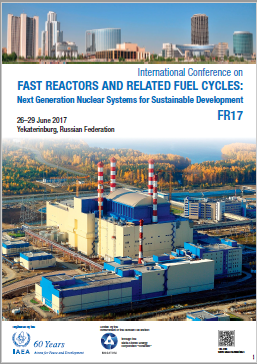Speaker
Mr
Hwan Yeal YU
(KAIST)
Description
This paper presents a physics study for a passive autonomous load-follow operation in a supercritical CO2-cooled micro-modular reactor (MMR). The proposed long-life 36.2 MWth MMR is a super-compact, fully-integrated, and truck-transportable fast reactor module in which all components are integrated in a single pressure vessel. UC fuel is considered to maximize the fuel inventory and to enhance neutron economy. The core lifetime is designed to be over 20 years without any refueling. To minimize the excess reactivity, a replaceable fixed absorber (RFA) is used and the resulting excess reactivity is found to be less than 1 $ during the whole lifetime of the core. For demonstration of a passive autonomous operation of the MMR, analyses for the reactor startup from initial CZP to HFP and daily load-follow operation are performed. In a passive autonomous load-follow operation, the reactor power is automatically controlled by the feedback reactivity only, which mainly depends on the fuel and coolant temperatures. For favorable passive autonomous load-follower operations, the core expansion feedback reactivity is also taken into account in this paper. All neutronics calculations are performed using the continuous energy Monte-Carlo Serpent code with the ENDF/B-VII.1 library.
Country/Int. Organization
KOREA / Department of Nuclear and Quantum Engineering,
Korean Advanced Institute of Science and Technology (KAIST)
Authors
Mr
Hwan Yeal YU
(KAIST)
Prof.
YongHee Kim
(KAIST)
Co-authors
Mr
Bong Seong Oh
(KAIST)
Prof.
JeongIk Lee
(KAIST)

